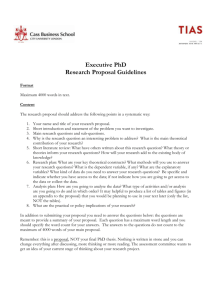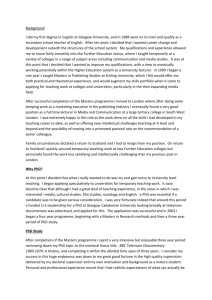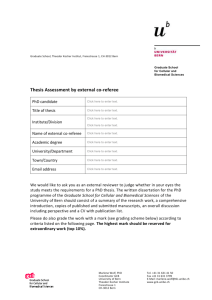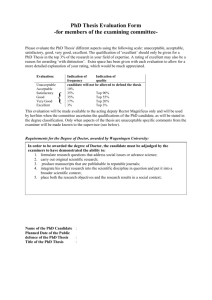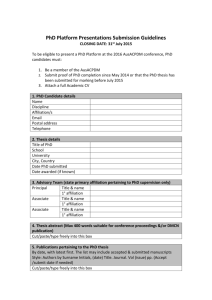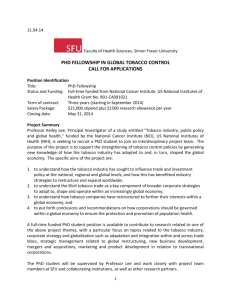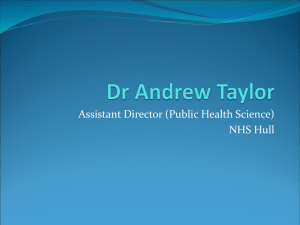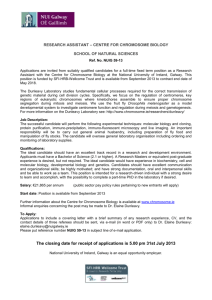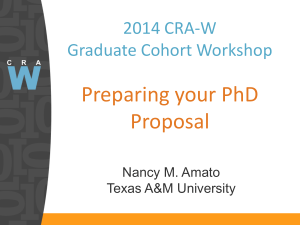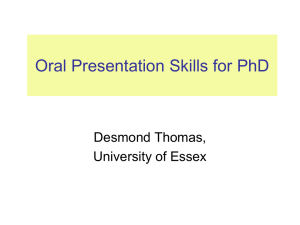Important - ORB - University of Essex
advertisement
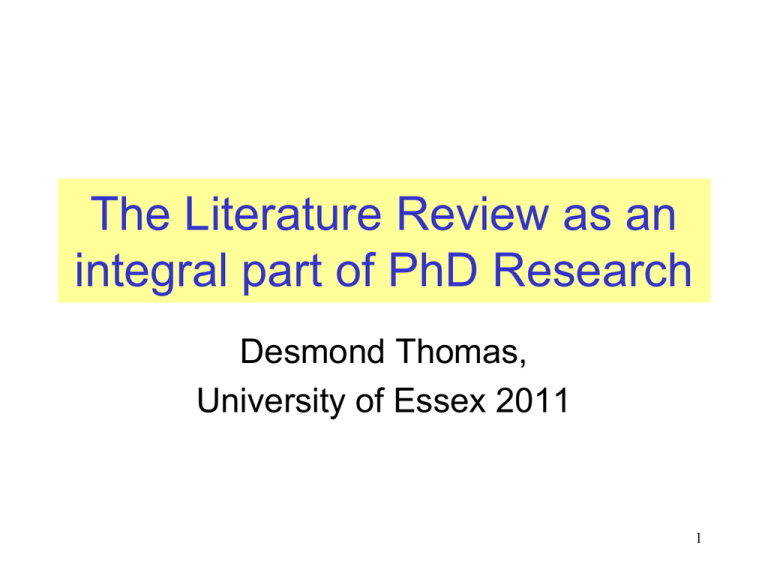
The Literature Review as an integral part of PhD Research Desmond Thomas, University of Essex 2011 1 The fundamental problems • A ‘Literature Review’ can mean many different things to many different people. It is essential to clarify what are the expectations of supervisors, examiners, departments (sometimes more than one) and whole research communities • Literature Review: Product vs Process 2 The U.of Essex Requirement • A thesis submitted by a candidate for the degree of Doctor of Philosophy must embody the results of research carried out during the approved period of study. In the thesis and examinations the candidate is required to conduct and present original investigations that make a significant contribution to knowledge, to test ideas, whether the candidate's own or those of others, to understand the relationship of the theme of the investigations to a wider field of knowledge and to express him/herself clearly and concisely. (University of Essex Website) 3 What does this mean? “to understand the relationship of the theme of the investigations to a wider field of knowledge” 1. To reveal current understanding of your topic (Thody 2006) 2. To relate a study to the larger ongoing dialogue in the literature about a topic (Cresswell 2003) 4 Literature Review Aims (one view) • Literature reviews are based on a systemic reading of existing academic writing on a particular topic … The aim is to survey and report on a reasonably large or complex field of work, in the process developing some themes to make the review distinctive (Dunleavy 1986:112) 5 The Literature Review: Process • Contextualizing a research topic • Testing research questions & claims, and examining counter-claims • Exploring other relevant projects and case studies • Exploring the research methodology itself 6 The Literature Review: Product Could take the form of …. 1. An introductory chapter, providing a context for your research project 2. A separate designated chapter within your PhD thesis 3. A composite of several chapters 4. Literature Review Sections to be integrated within different chapters 7 The ‘Interim’ Literature Review Can serve several purposes: 1. Evidence that the research is making progress (as part of upgrading) 2. An opportunity to demonstrate the quality of your academic writing 3. An opportunity to clarify your stance in relation to other writers 8 A reminder: your presence is still required • “In literature reviews the critical element most frequently missing is an explicit angle or theme – a sense of what the author wants to do differently or what insights she hopes to gain from completing the review.”(Dunleavy 1986 113-4) • “It is important that you specify at the outset the angle from which you propose to survey a literature. This step needs to be taken long before you actually start writing up a draft. Once identified, your individual approach should inform the selection of materials included throughout the dissertation.”(Dunleavy 1986: 114) 9 Issue 1: Accessing Source Materials • • • • • • • • • • Library catalogues Electronic databases ‘Grey literature’ (theses, websites etc) E-books Conference proceedings Statistics Discussions Subject guides Google Scholar Endnote 10 Issue 2: Selecting texts 1. ‘Seminal’ text: the most important 2. Important text that merits detailed reading and understanding 3. Useful text that contains more than one interesting or relevant idea 4. ‘Single item’ text that contains one useful fact, quotation, example etc. 5. Possible text that just might be useful 11 Issue 3: Leaving your tracks • • • • • • • Recording references to the whole text Summarizing some/all of the ideas Highlighting interesting quotations Querying claims made in the text Comparing the text to others Writing and filing analytical notes Preparing summaries of analytical notes 12 Issue 4: Setting yourself goals so that you don’t get lost in the literature Example: • Week 4: Research plan agreed with supervisor • By end of term 1: Oral presentation of work • By end of term 1: Submit a 5-10000 word review of the relevant literature What if you fail to achieve your goals? 13 Goals, schedules & routines quiz 1. 2. 3. 4. 5. When are you at your most productive: 8am, 3pm, 9pm, 2am? Or does it vary? Which days of the week are dedicated to the PhD? How many months of the year will be mainly dedicated to PhD work and which will not? How much writing would you expect to produce in a day dedicated to writing: 250, 500, 1000 words? Where do you prefer to read/write? Managing a research project 2010 14 Issue 5: Time Management • A monthly plan: helps you to allocate tasks to a particular period • A weekly schedule: helps establish a productive routine for reading & writing • Both of these will help you – and also help your supervisor to help you 15 Cresswell’s Literature Review Steps • Identifying key words for searches • Locating suitable texts • Selecting according to the abstract or by skimming. (Record your decision!) • Draw a ‘literature map’ • Summaries of relevant articles What is missing in this account? 16 Literature Review Map 1 17 Literature Review Map 2 18 Literature Review Map 3 19 From LR map to LR chapter structure 1. Introduce the LR and explain its structure. Explain also how you will relate it to your research questions 2. Organize the chapter according to important themes or issues related to research aims, questions or claims 3. Add a concluding section in which you pull all the different themes together 20 Questions 1. What type of LR do you need for your PhD thesis? 2. Do you need to write an interim LR? 3. What steps will you follow to assemble the relevant literature? 4. How will you record your reading? 5. How will you integrate your notes? 21 For Next Class …. • Which key concepts do you need to explore as part of your Literature Review? • Familiar concepts: Culture, democracy, social identity, human rights • More technical concepts: fungibility • Are these concepts contested? 22
